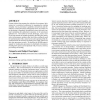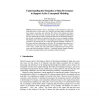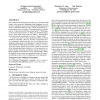112
click to vote
ER
2010
Springer
15 years 19 days ago
2010
Springer
: Data provenance is becoming increasingly important for biosciences with the advent of large-scale collaborative environments such as the iPlant collaborative, where scientists co...
116
click to vote
HPDC
2010
IEEE
15 years 3 months ago
2010
IEEE
Current projects that automate the collection of provenance information use a centralized architecture for managing the resulting metadata - that is, provenance is gathered at rem...
121
click to vote
ER
2006
Springer
15 years 5 months ago
2006
Springer
: Data Provenance refers to the lineage of data including its origin, key events that occur over the course of its lifecycle, and other details associated with data creation, proce...
109
click to vote
ICDT
2001
ACM
15 years 6 months ago
2001
ACM
Withthe proliferation of database views and curated databases, the issue of data provenance where a piece of data came from and the process by which it arrived in the database is b...
133
click to vote
SEMWEB
2009
Springer
15 years 6 months ago
2009
Springer
: Data Provenance refers to the “origin”, “lineage”, and “source” of data. In this work, we examine provenance from a semantics perspective and present the W7 model, an...
111
click to vote
SIGMOD
2010
ACM
15 years 6 months ago
2010
ACM
Many advanced data management operations (e.g., incremental maintenance, trust assessment, debugging schema mappings, keyword search over databases, or query answering in probabil...
111
click to vote
VLDB
2007
ACM
15 years 8 months ago
2007
ACM
Tracing the lineage of data is an important requirement for establishing the quality and validity of data. Recently, the problem of data provenance has been increasingly addressed...
DBPL
2007
Springer
15 years 8 months ago
2007
Springer
Abstract. Provenance is information recording the source, derivation, or history of some information. Provenance tracking has been studied in a variety of settings; however, althou...
112
click to vote
BTW
2007
Springer
15 years 8 months ago
2007
Springer
: In many application areas like e-science and data-warehousing detailed information about the origin of data is required. This kind of information is often referred to as data pro...
117
click to vote
ICDE
2008
IEEE
15 years 8 months ago
2008
IEEE
Network accountability and forensic analysis have become increasingly important, as a means of performing network diagnostics, identifying malicious nodes, enforcing trust managem...



